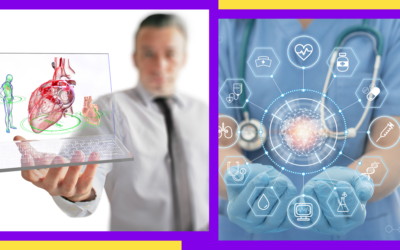As a Star Trek fan, I always thought of ‘Artificial Intelligence’ (AI) like the Starship Enterprise. In my mind it was an ever-present computer system that speaks in kind, maternal tones. It gladly helps humans through whatever quest we undertake.
Many of my nurse peers picture AI being more like ‘Terminator.’ They see AI as machines set on destroying humans, or at least our jobs.
I also thought we were lightyears away from AI being anything like what Lieutenant Uhura or Sarah Conner encountered.
The reality is AI is already here and making an impact on health care. Global spending on AI applications in healthcare is expected to reach $36.1 billion by 2025.
As a nurse, I wanted to understand what AI actually is. I also want to know what it is being used for in healthcare, and what the nurse’s role will become.
Most articles I read about AI in healthcare are geared toward physicians. However, nurses have a central role to play in healthcare with tools driven by artificial intelligence.
This post covers the ways in which I see AI making an impact on nursing. I split it into 2 parts since it is such a big topic, and my guide alone is not comprehensive.
My hope is to give nurses a consolidated introduction so we have a common understanding.
What is Artificial Intelligence (AI) anyway?
When we think of AI, we usually picture a computer or robot being able to do things a human would normally do. This includes abilities like being able to see, hear, speak, and make decisions similar to a person.
One description sums up AI as: “Simply put, it is the ability of a machine to emulate intelligent human behavior.”

AI is not a single technology, but actually a group of technologies. These technologies can perform various functions depending on the problem being addressed.
Here are some terms to know:
- Cognitive technology: The ability for a computer to simulate human thought processes.
- Machine learning: The ability for a computer to solve problems for which it was not programmed.
- Deep learning: A type of Machine Learning that uses a network of algorithms. These algorithms are connected to each other like neurons in the brain. This is why it is called a Neural Network. The structure allows computers to solve more complex problems and recognize complex things like faces.
- Natural Language Processing: A type of AI that allows machines to read, hear, and understand human languages.
- Chatbot: A software that combines AI and language to have a conversation with a human. The machine is capable of understanding what the human is saying and analyze various answers. It can learn from the human’s responses so it provides progressively better answers.
- Big Data: The use of vast sources of data to find trends, make associations, and solve problems. As humans, we now create huge amounts of data. Our data covers everything from what we buy at Target to our heart rate in a Fitbit.
This is an important moment because there is more data available than ever before and we have machines powerful enough to do something with it.
What can AI do that makes a difference to nurses?
I see AI impacting nurses two ways: (1) Giving insights and guidance, and (2) Being an extension of our patient relationships. I will cover the first category in this post, and the second in my next post.
AI providing insights and guidance:
Use 1: AI being able to mine large amounts of medical data to bring forward insights.

One of the benefits of AI is that it can sift through the enormous amounts of data.
That means AI can find information in medical records, research databases, and publicly available data sources like county records. From this information it can make recommendations.
Several examples you may have heard of:
- Google Health/DeepMind: Google is using AI to help with cancer diagnosis, predicting patient outcomes, averting blindness, and more. They recently came up with an AI solution to identify breast cancer, beating human radiologists by 11.5%.
- IBM Watson: Watson was made famous initially by beating Jeopardy Champion Ken Jennings. Since that win, IBM has been integrating data sources in Watson Health Cloud so Watson can provide more meaningful insights.*
It is not a stretch to see these sorts of capabilities being extended to the bedside. For example, Google Health could help find the best treatment methods for wound healing.
*Please note: Watson also recently faced criticism for making erroneous treatment recommendations, so to protect patient safety, many partner companies have put their oncology collaboration projects on hold.
Use 2: AI working alongside healthcare front line to catch subtle symptoms and triage to appropriate care.

Imagine you are on-call supporting a Nurse Help Line:
Before the call is transferred to you, the patient has already been assessed and their symptoms documented. A possible cause of their symptoms has been identified and provided to you.
You also have not gotten any calls passed to you because someone else did not feel like dealing with the patient. Each call needed a nurse’s attention, and you are able to use your time effectively.
That is the reality Babylon hopes to bring about. The company combines AI with live clinicians to create a seamless experience.
Babylon triages patients using a chatbot that has them to describe their symptoms and asks appropriate clarifying questions. The bot then identifies the likely cause, aligns the patient with a qualified provider, and sets up a virtual visit.
A company called Corti also assists with triage but takes a slightly different approach. Corti provides AI triage software that works alongside emergency staff.
Corti’s AI listens to the emergency caller’s tone of voice, background noise, and words used. It combines this information with historical data, and provides a real-time script to guide the emergency dispatcher.
It also records every answer received and symptom detected so that information can be sent to emergency providers. Corti believes their AI has the potential to reduce liability and save lives by making sure the right questions are asked at the right times.
Use 3: AI providing medical expertise and capabilities previously held only by specialists.

This use could actually be great news for nurses, especially Advanced Practice Nurses. There are AI applications already in the market that allow medical imaging to be done by non-specialists. There are also applications where AI is providing medical specialist expertise.
Recognizing a need for imaging to be done cheaper, a number of companies have emerged.
Butterfly Network offers a handheld medical imaging device that can do ultrasounds. It includes a single probe that starts under $2,000, and projects into an app.
The company wants to bring imaging to low resource settings around the world.
Caption Health is another example. Their AI application provides medical expertise, so specialty decision making can be done at the point of care by any provider.
These technologies could enable Nurse Practitioners to do things currently performed by physician specialists. We may also find that AI tools allow Registered Nurses to do things that previously required advanced training.






0 Comments